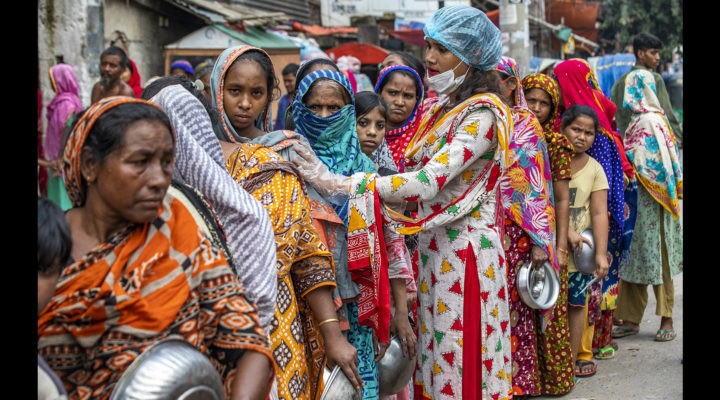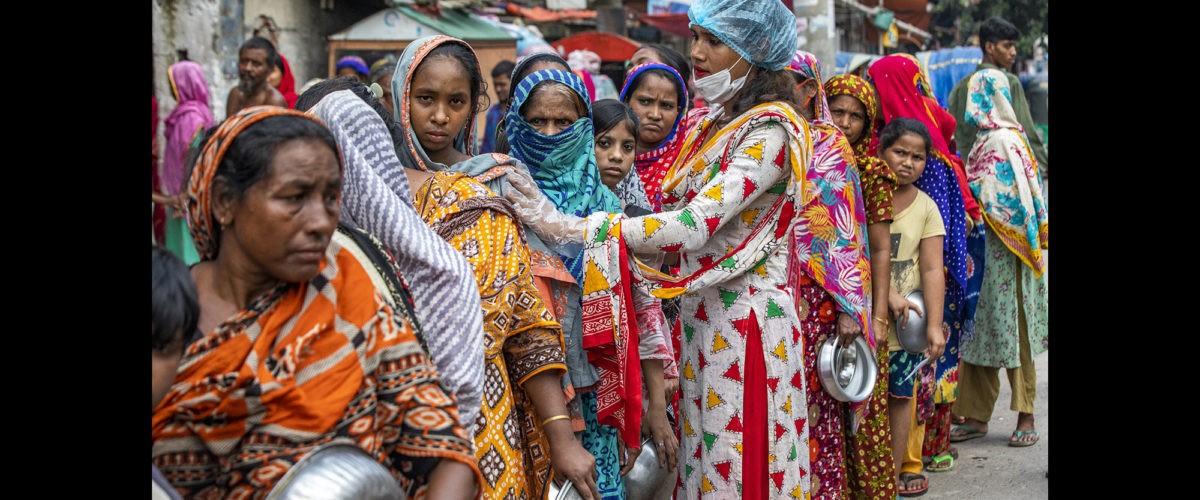In order to keep the senior minister from becoming popular, Plymouth Church observes World Hunger Day on the second Sunday of October each year.
We sing hunger hymns none of us like. We add hunger to the list of prayer concerns. During the children’s sermon we encourage kids to share candy. We read a lot of hunger-related Scripture, because we will never run out. By one count, the Bible has 3,000 verses on sharing with the poor. If worship themes were in proportion to the attention given in Scripture, we would have several world hunger months each year. We close the service by coercing everyone into placing their offering on the Communion table.

Brett Younger
You might think liberal churches would latch on to the issue of hunger, but most do not. When we talk about racism, immigration, human trafficking, climate change or LGBTQ issues, liberals know we are not the really bad people. When we talk about hunger, we are front and center part of the problem.
World Hunger Day is unpopular because it costs money, and our finances are confusing right now. Some of us have spouses who want to give more than we want to give.
World Hunger Day does not appeal to church leadership. We worry about criticism that the church is always asking for money. Feeding hungry children on the other side of the world will not increase church attendance.
World Hunger Day does not make the preacher well-liked. I have gotten angry emails after World Hunger Day explaining that the author of the e-mail “worked hard for everything I have, and you have no right to make me feel guilty.” None of us want to feel guilty about what we buy. We do not want to ask ourselves every time we order take-out, “Is this the best use of God’s money?”
This year I decided to lean into my discomfort and preach on the parable of the sheep and the goats. There are lots of paintings of the waiting father embracing the prodigal son and the Good Samaritan helping the man in the ditch, but there are not any pictures of the goats being damned on the walls of children’s Sunday school classes.
“World Hunger Day does not make the preacher well-liked.”
As a child, I was in church every Sunday that I did not pretend to have a cold, and I do not remember ever hearing a sermon on Matthew 25:31-46. In Bible studies, this is one of those passages where the teacher ends up saying, “We agree that Jesus didn’t mean what he said, but what did he mean?”
Most of the time we skip this story. Jesus tells everyone to take a seat: “Listen carefully. Judgment Day is coming and there will be surprises. The king will say to the sheep on the right hand, ‘Come and get your reward. When I was a victim of famine, you sent food. When I needed a drinking well, you took up an offering. When I was homeless, you found me a place. When I was shivering, you gave me a coat. When I was in prison, you tried to help. Now it’s time to show my appreciation.’”
“They will say, ‘We don’t mean to seem ungrateful, but we don’t remember any of that. When did we do those things for you?’”
“The judge will answer, ‘You’ve been doing it all your lives. Every time you helped one of your needy brothers and sisters, you cared for me.’”
“Then the king will turn to the goats on the left hand and say, ‘To hell with you. When I was hungry, you kept your money in your wallet. When I had only polluted water to drink, you were worried about your IRA. When I was homeless, you wouldn’t look me in the eye. When I was cold, you had extra blankets in your closet. When I was in prison you said, ‘Let’s build more prisons.’”
“They will say, ‘We never did that to you. As for the poor, we don’t know any poor people.’”
“They will say, ‘We never did that to you. As for the poor, we don’t know any poor people.’”
When I read the text on Sunday, I made it clear that this was Jesus’ opinion. Religious people tend to boil down the wonderful biblical theme of salvation (which is about wholeness and healing) into a formula — four laws or five steps. This is as close as Jesus ever comes to summarizing what it means to be saved, but no one ever puts this on their church’s website under the heading, “How to Become a Christian.”
According to Jesus, those who do not care for the poor have missed the gospel. How could Jesus have been any clearer? Each face of each starving child is the face of Jesus Christ.
We do not care for this story, because most of us have not done much. The problem seems overwhelming. A deadly combination of COVID, conflicts and climate change have pushed hunger to record levels. By one hunger relief organization’s estimate, 25,000 die each day of hunger-related diseases.
“Sometimes it is hard to tell how God feels about a particular issue, but hunger is not one of those issues.”
Our lack of concern is embarrassing. According to one study, most Americans who call themselves Christians give less than a dollar a year to feed the hungry. We lose sleep over problems at work, difficulties at school and troubles at home, but few of us lose sleep over children starving. We tell ourselves there is nothing we can do about it, but that is not true.
We cannot solve the problem of world hunger, but we can make a difference. We can ask whether we care enough for children of God we will never meet to give up some measure of our comfort to save their lives.
Sometimes it is hard to tell how God feels about a particular issue, but hunger is not one of those issues. It is always judgment day, and we have to decide whose side we are on.
Brett Younger serves as senior minister of Plymouth Church in Brooklyn, N.Y.
Related articles:
Want to help slow immigration to the U.S.? Address global hunger
New endowed academic chair will lead Baylor in research to end hunger


